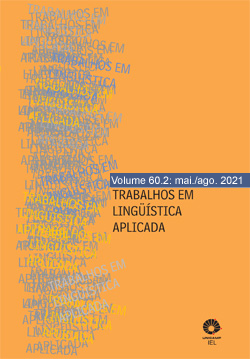Abstract
In the so-called "new globalized economy", in concomitance with the expansion of capital, massive technological advances have produced, on the one hand, unprecedented possibilities for the circulation of information and resources, as well as displacements of populations that can assume post- or transnational identities (DE FINA & PERRENNO, 2013). On the other hand, the logic of globalization and the fractionation of production chains have meant in many contexts a deepening of social differences, and language has become an even more relevant part in this stratification process, often mediating categorization processes that organize and legitimize inequality (HELLER, 2011). Such phenomena have brought new challenges for language studies interested in understanding what is happening in scenarios of great sociolinguistic diversity, more evident in some scenarios than in others, in general as observed by the centers or peripheries of capitalism. The Covid-19 pandemic made it even more complex to understand the contradictions of capitalism and its relations with language in these scenarios by causing sudden changes in interactional dynamics and in people's flows. This dossier brings together works that examine concepts that have entered the core of the discussion in Applied Linguistics and Sociolinguistics in the last 15 years, such as post-nationalism, language mercantilization and linguistic repertoires, among others, based on studies located in localized scenarios.
References
ANDERSON, B. (2006[1983]). Imagined communities: Reflections on the origin and spread of nationalism. Londres: Verso. [Tradução brasileira: Anderson, B. (2008). Comunidades imaginadas (D. Bottman, Trad.). São Paulo: Companhia das Letras.]
BAUMAN, R.; BRIGGS, C. L. (2003). Voices of modernity: Language ideologies and the politics of inequality. Cambridge, RU: Cambridge University Press.
BLOCK, D. (2017). Political economy in applied linguistics research. Language Teaching, v. 50, n. 1, p. 32–64.
BLOCK, D. (2018). Political economy and sociolinguistics: Neoliberalism, inequality and social class. Londres/Nova Iorque: Bloomsbury Publishing.
BLOCK, D.; GRAY, J.; HOLBOROW, M. (2012) (orgs.). Neoliberalism and applied linguistics (p. 1-13). Routledge.
BLOMMAERT, J.; RAMPTON, B. (2011). Language and superdiversity. Diversities, v. 13, n. 2, p. 1-21.
CAVANAUGH, J. R.; SHANKAR, S. (2014). Producing authenticity in global capitalism: Language, materiality, and value. American Anthropologist, v. 116, p. 51–64.
CHUN, C. W. (2017). Discourses of capitalism: Everyday Economists and the Production of Common Sense. Oxon, Ru/Nova Iorque: Routledge.
DE FINA, A.; PERRINO, S. (2013). Transnational identities. Applied Linguistics, v. 34, n. 5, p. 509–515.
DUCHÊNE, A.; HELLER, M. (orgs.). (2012). Language in late capitalism: Pride and profit. Nova Iorque York: Routledge.
FINE, J. C.; LOVE-NICHOLS, J. (2021). Language and climate justice: A research agenda. Journal of Sociolinguistics. Publicação eletrônica antecipada. (DOI: https://doi.org/10.1111/josl.12469)
FIORIN, J. L.; PETTER, M. (2008). Prefácio. In: África no Brasil: a formação da língua portuguesa. São Paulo: Contexto, p. 7-12.
FRASER, N. (1996). Social justice in the age of identity politics: Redistribution, recognition, and participation. Conferência na Universidade Stanford. The Tanner Lectures on Human Values. Disponível em: <https://tannerlectures.utah.edu/_documents/a-to-z/f/Fraser98.pdf>.
GAL, S.; IRVINE, J. T. (2019). Signs of difference: Language and ideology is social life. Cambridge, RU: Cambridge University Press.
HARVEY, D. (2005). A brief history of neoliberalism. Oxford, RU: Oxford University Press.
HARVEY, D. (2014). Seventeen contradictions and the end of capitalism. Oxford, RU: Oxford University Press.
HELLER, M. (2002). Globalization, the new economy and the commodification of language and identity”. Journal of Sociolinguistics, v. 7, n. 4, p. 473-492.
HELLER, M. (2005). Language, skill and authenticity in the globalized new economy. Revista de Sociolingüística, v. 2.
HELLER, M. (2010). The commodification of language. Annual Review of Anthropology, v. 39, p. 101-14.
HELLER, M. (2011). Paths to post-nationalism: A critical ethnography of language and identity. Oxford: Oxford University Press.
HELLER, M.; MCELHINNY, B. (2017). Language, capitalism, colonialism: toward a critical history. Toronto: University of Toronto Press.
HELLER, M.; DUCHÊNE, A. (2012). Pride and profit: Changing discourses of language, capital and nation-state. In A. Duchêne; M. Heller (orgs.), Language in late capitalism: Pride and profit. Nova Iorque: Routledge, p. 1-21.
HELLER, M.; DUCHÊNE, A. (2016). Treating language as an economic resource: Discourse, data and debate. In N. Coupland (org.), Sociolinguistics: Theoretical debates. Cambridge, RU: Cambridge University Press, p. 139-156.
HELLER, M.; PIETIKÄINEN, S.; PUJOLAR, J. (2018). Critical sociolinguistics research methods. Nova Iorque: Routledge.
HOBSBAWM, E. (1990). Nations and nationalism since 1780. Cambridge, RU: Cambridge University Press. [HOBSBAWM, E. (1990). Nações e nacionalismo desde 1780: programa, mito e realidade. Tradução de M. C. Paoli e A. M. Quirino. São Paulo: Paz e Terra.]
IRVINE, J. (2021, 7-10 de junho). Revisiting theory and method in language ideology research [Conferência plenária]. E-Sociolinguistics Symposium 23. Hong Kong, China.
JAFFE, A. (2011). Critical perspectives in language-in-education policy: The Corsican example. In: McCarty, T. L. (org.), Ethnography and language policy. New York: Routledge, p. 205-229.
MOITA-LOPES, L. P. (2006). Linguística aplicada e vida contemporânea: problematização dos construtos que têm orientado a pesquisa. In L. P. Moita-Lopes (org.), Por uma linguística aplicada indisciplinar. São Paulo: Parábola, 85-107.
MOITA-LOPES, L. P. (2013a). Ideologia linguística: como construir discursivamente o português no século XXI. In: L. P. Moita-Lopes (org.), Português no século XXI: ideologias linguísticas. São Paulo: Parábola, p. 18-52.
MOITA-LOPES, L. P. (2013b). Como e por que teorizar o português: recurso comunicativo em sociedades porosas e em tempos híbridos de globalização cultural. In: L. P. Moita-Lopes (Org.), Português no século XXI: ideologias linguísticas. São Paulo: Parábola, p. 101-119.
OLIVEN, R. G.; GARCEZ, P. M. (2020). “A mudança social se desenrola conflituosamente no terreno da linguagem”. Entrevista com Monica Heller (Professora da University of Toronto). Horizontes Antropológicos, v. 26, n. 57, p. 315-359. (DOI: https://doi.org/10.1590/s0104-71832020000200011)
PERLEY, B. C. (2021). Dare we hope? Journal of Sociolinguistics. Publicação eletrônica antecipada. (DOI: https://doi.org/10.1111/josl.12465)
URCIUOLI, B. (2008). Skills and selves in the new workplace. American Ethnologist, v. 35, n. 2, p. 211-228.
WILLIAMS, R. (1973). The country and the city. Londres: Chatto and Windus. [WILLIAMS, R. (1998). O campo e a cidade na história e na literatura. Tradução de Paulo Henriques Britto. São Paulo: Cia. das Letras.]

This work is licensed under a Creative Commons Attribution 4.0 International License.
Copyright (c) 2021 Trabalhos em Linguística Aplicada


